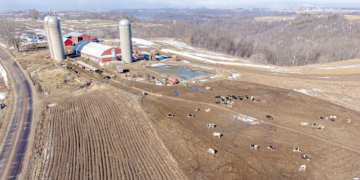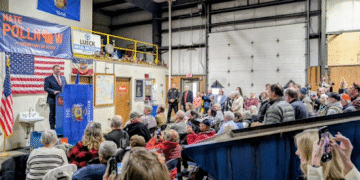It may soon be illegal for companies in or controlled by “foreign adversaries” to own land in Wisconsin if a new bill is signed into law.
SB 7, authored by a trio of Wisconsin Republicans, “generally prohibits a foreign adversary from acquiring agricultural or forestry land in this state.” A “foreign adversary” would be defined by the U.S. Department of Commerce, which currently includes China, Cuba, Iran, North Korea, Russia and Venezuela on its list.
One of the bill’s authors, Sen. Andre Jacque, stresses it does not prevent investment in Wisconsin by nations friendly to the United States and that the bill will close “a dangerous loophole” that currently allows state-owned enterprises controlled by adversarial nations to own land in the state.
Action stemmed partially from a 2021 news report on the acquisition of land by a Chinese-owned company in close proximity to an Air Force base in North Dakota. Jacque said he’s heard from constituents concerned “about foreign ownership of farmland threatening national security” and the “active risks to our domestic food systems.”
Wisconsin Farm Bureau’s Tyler Wenzlaff told The Cap Times that “it’s a good idea to keep an eye on potential property sales to foreign buyers” and wants to ensure the bill’s “focus remains on countries deemed clearly adversarial.”
A competing but similar bill, sponsored by Rep. Clint Moses and Sen. Rob Stafsholt called the Wisconsin Farmland Protection Act, would prevent foreign entities from acquiring or owning more than 50 acres of farmland in the state and bans foreign adversaries “rom owning any land in the state or property withing 10 miles of military installations.”
Wisconsin radio host Vicki McKenna recently interviewed Michael Lucci of State Armor, a company whose goal is “to help states enact solutions to global security challenges.” During the interview, Lucci applauded SB 7 and called the issue a bipartisan concern, citing Arizona and Kansas, both of whom have Democrat governors.
Lucci explained an example of this issue that occurred in Nebraska, in which Syngenta, a seed company that is now a subsidiary of a Chinese state-owned enterprise, wanted to meet with Gov Pillen. Pillen declined the meeting, telling the company to “get out of Nebraska.” The company’s Nebraska assets were eventually sold to an American company. (RELATED: Congressman Demands Accountability as Canadian Wildfires Endanger Wisconsin Residents)
At the federal level, lawmakers have introduced bipartisan legislation—the Agricultural Foreign Investment Disclosure Improvements Act—to tighten oversight of foreign ownership of U.S. farmland, particularly targeting China. Prompted by a January 2024 Government Accountability Office report, the bill would require disclosure from foreign entities with over 1% ownership, improve coordination between federal agencies, and update reporting guidelines.
As of late 2023, Chinese investors owned over 277,000 acres of U.S. farmland according to the USDA, amid a broader trend of rising foreign ownership. The same report shows 2.6% of agricultural land in Wisconsin was owned by foreign entities.
Additionally, Wisconsin Sen. Tammy Baldwin, a Democrat, joined forces with her Republican colleague Iowa Sen. Chuck Grassley to introduce the Farmland Security Act of 2025, which places increased oversight over the sale of American land to foreign-owned entities. (RELATED: Immigration Raids Land Prominent Democratic Donor in Hot Water)
Similar efforts are underway in other states. Republican Utah Gov. Spencer Cox blocked the sale of land near the Provo airport to a company linked to the Chinese military. Cox said that regardless of the size of the investment potential, Utah is “not for sale” and that efforts to restrict foreign ownership of land in the state is “crucial” as “some of the most important military missions and testing activities…can only happen here.” Utah passed legislation in 2023 banning certain companies with affiliations with foreign adversary’s militaries from purchasing Utah land.
In Arizona, Democrat Gov. Katie Hobbs is pushing legislation nearly identical to the Moses and Stafsholt bill, preventing foreign adversaries from owning land near military bases. Hobbs said it was necessary and criticized Arizona House Republicans for being “weak and spineless” when passing legislation that would have allowed nations like China to own land in the state for three years.
While efforts to restrict foreign ownership of American land are bipartisan and nationwide, critics say the threat is overblown. Cornell University’s Wendon Zhang told Wisconsin Public Radio last year “if you’re concerned about significant Chinese holdings of agricultural land in Wisconsin, the evidence seems to say the contrary” and that Canada, Denmark, and Portugal are the largest foreign owners of land in the state. None of those countries are listed as foreign adversaries. (RELATED: Progressive Wisconsin Congressman Caught up in ‘Cyberstalking’ Allegations on X)
































